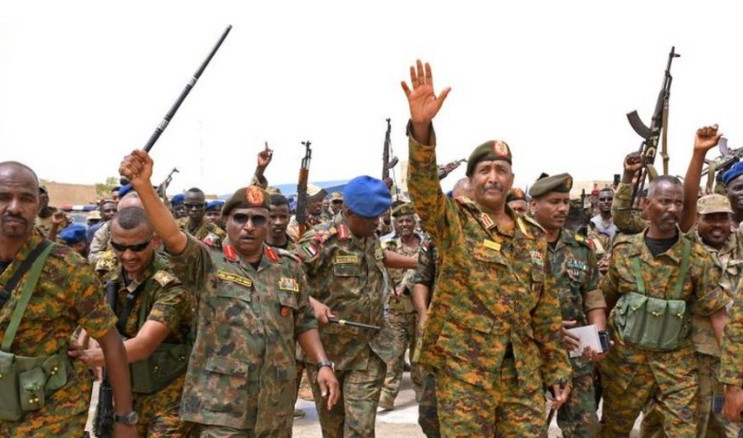

April 15, 2025, marks two years since civil war broke out between the military and the paramilitary group Rapid Support Forces (RSF).
Sudan has been mired in a brutal civil war since April 2023, when tensions between the Sudanese Armed Forces (SAF) and the RSF erupted into full-scale conflict.
The two factions, once allies in the 2021 military coup that ousted the transitional civilian government, turned against each other in a power struggle that has devastated the country.
The SAF, led by General Abdel-Fattah al-Burhan, represents Sudan’s official military.
The civil war is the latest episode in a series of tensions that followed the 2019 ousting of long-serving President Omar al-Bashir.
A framework agreement to transfer power back to civilians was reached in December 2022, but negotiations to finalize the details collapsed.
The SAF controls air power and heavy artillery and has sought to maintain control over key government institutions.
The RSF was formed in 2013 and has its origins in the notorious Janjaweed militia, which was responsible for atrocities in Darfur, including ethnic cleansing against the region's non-Arab population.
The war, which continues to this day, has claimed more than 150,000 lives.
Even before the war started, Sudan, with a population of about 46 million people, was one the poorest countries in the world.
The situation has only been made worse by the civil war.
According to the United Nations, at least 13 million people have been forced to flee their homes.
With civil war ongoing, RSF for a long time leveraged guerrilla tactics and urban warfare to challenge the SAF’s authority.
As of March 2025, the SAF has made strategic gains in Khartoum, including the recapture of the international airport and the presidential palace.
This marks a significant shift in the conflict, signaling the potential weakening of the RSF’s hold on the capital.
However, fighting continues in other parts of the country, particularly in Darfur and the southern regions, where the RSF still maintains control.
The SAF’s recent successes follow months of intense battles to reclaim urban areas previously held by the RSF.
This comes against the backdrop of efforts by the RSF to form a parallel government from Nairobi, where they have gone ahead to sign charters together with allied rebel groups.
The signing of the agreement was a culmination of intense four-day negotiations in Kenya by key stakeholders who convened in Nairobi.
It is believed the group called Sudan Founding Alliance will steer the nation towards the realisation of a new Sudan.
Over 20 political parties across Sudan, 10 civil organizations, and 5 military groups led by RSF were among other lobby groups that were the signatories of the charter.
The charter resolved that a new army should be established which featured all parts of Sudan and desist from political interference.
The new army would stop the ongoing war in Sudan, fight terrorism and further boost diplomatic relations with neighbouring countries.
The decision by Kenya to allow the RSF to conduct its activities from Nairobi and host its leaders has also seen relations between Kenya and Sudan worsen with time.
This is despite Kenya insisting that it does not support the RSF, reiterating its commitment to a peaceful process.
Sudan has already banned the importation of Kenyan tea into the country.
8.9 million internally displaced and 3.4 million seeking refuge in neighboring countries.
Famine warnings have been issued for five of Sudan’s 18 states, including Khartoum, as aid access remains severely restricted.
Reports indicate that both sides have committed severe human rights violations, including attacks on civilians, ethnic-based killings, and sexual violence.
According to the UNHCR, the immediate problem in Sudan is a lack of necessities, combined with violence and uncertainty, which has forced many people to flee their homes.
Egypt is hosting the largest number of Sudanese refugees (1.5 million), followed by Chad (773,662), South Sudan (349,935), Libya (256,000), Uganda (72,125) and Ethiopia (43,159). In South Sudan, most of those arriving are returning nationals (744,412) who had been living in Sudan as refugees.
The UN says at least half of Sudan’s population, about 25 million people, need humanitarian assistance and protection.
“The country is facing extreme shortages of food, water, medicine and fuel and more than half the population (25.6 million) are facing acute food insecurity, including 8.5 million of them at emergency levels.”
Who says that attacks on healthcare facilities, equipment and workers are further depriving women and girls of lifesaving care, with pregnant women hardest hit.
Even as this remains the situation, none of the warring
sides has committed to a peaceful handover of power.

![[PHOTOS] Kindiki inspects works at regional centre in Kwale](/_next/image?url=https%3A%2F%2Fcdn.radioafrica.digital%2Fimage%2F2025%2F04%2Fc68aa00b-39bc-4214-bafe-80e8e38b1e60.jpg&w=3840&q=100)









